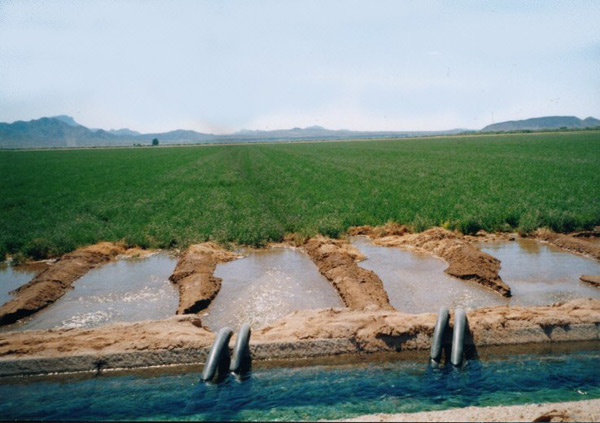

According to Arizona Farm Bureau, Agriculture is a $12.4 billion industry in Arizona. It is also the foundation on which much of Arizona was built – including the two largest metro areas. Irrigation in the Phoenix valley following in the footsteps and often ditch alignments of the Hohokam people before us (see the Easter Egg 1886 map in the Extras section of this site). Construction of the Roosevelt Dam was a seminal event in central Arizona’s history. In Arizona agricultural lands can be viewed within two broad categories – irrigated (or formerly irrigated) farmland – and livestock ranches comprised primarily of native terrain and vegetation.
Buyers of agricultural land are motivated by a number of factors including:
- Production agriculture
- Income / cash rents or production participation
- Portfolio diversification
- Inflation hedge
- Wealth preservation
- Capital Appreciation
- Stable risk adjusted returns
- Deferring capital gains taxes through IRC 1031 exchanges
- Habitat mitigation – land and / or water components
- Land banking
- Water banking
- Operational buffer / tenure control for certain types of facilities
As an asset class, agricultural land represents a small fraction of investment portfolios. In recent years private equity firms, institutional investors and asset management companies have been adding production agricultural land and related agribusiness assets to their portfolios. Some of this investment is via agricultural focused real estate invest trusts REITs.
In terms of land values, one way to view Arizona farmland is in two broad categories or classes – 1) land in outlying rural areas which will likely remain in production for many years; and 2) land within or on the periphery or developing urban areas. Arizona farmland in and near the metro areas has prices driven in large part by urban influence – the perceived potential for non-agricultural development at some point in the future.
Water rights associated with / appurtenant to farmland in Arizona may enable or facilitate its development for other uses – see more discussion under Water in the Natural Resources section. Water rights are a key consideration when evaluating land resources in Arizona. Arizona water law is complex and any questions should be addressed by legal counsel well versed on the subject. They are some very good water law attorneys in Arizona and the west that can provide guidance.
Agricultural land buyers should take the necessary steps to ensure that they acquire any water rights associated with a property being purchased. This typically requires research and filing relevant forms with the Arizona Department of Water Resources. In some cases the process can be somewhat complex and may take some time. This should be either done by legal counsel well versed in Arizona water law or with their guidance. See more detailed discussion of Water and Water rights in the Natural Resources section.
Agricultural land is a popular choice for both relinquished and selected land in tax deferred IRC 1031 exchanges. Irrigated farmland is often available in a range of tract sizes and price levels. The property may have an existing lessee that will continue farming the land – keeping the property in productive use. And professional management is readily available for many agricultural properties.
IRC 1031 tax deferred exchanges: For some investors and other market participants it can make sense to offset or partially offset capital gains taxes through an IRC 1031 exchange. Land market participants contemplated a 1031 exchange should consult with their attorney and a tax professional. There are specific requirements associated with 1031 exchanges – most land market participants make use of Qualified Intermediaries when doing a 1031 exchange. It is important to select a highly reputable and competent Qualified Intermediary as they are critical to the process. Increases in the capital gains tax rate tend to make 1031 exchanges more popular.
At any given time there are numerous properties available in Arizona from relatively small tracts to farms or ranches of several thousand acres – individual tracts or packages of agricultural land with prices from less than $1 million to over $100 million dollars. Some properties will have relatively straightforward due diligence and relatively short conveyance timelines. Agricultural land can be found in locations ranging from within or on the periphery of the metro areas to relatively remote rural areas with little to no urban influence. This can enable 1031 participants to scale their replacement (acquired) property or properties to fit their plans.
IRC 1031 tax deferred exchanges are not for all market participants. Some sellers simply prefer to take cash and pay the relevant capital gains taxes. And again, there are strict requirements associated with 1031 exchanges including time constraints – including the 5 day rule for a qualified exchange accommodation agreement; the 45 day rule to identify property to be relinquished; and the 180 day rule for receipt of replacement property.
Prospective buyers of agricultural and should consider their planning horizon. Compared to other types of investments like equities or bonds, agricultural land assets (like other types of directly owned real property) are relatively illiquid. Dynamic market conditions may enable solid returns over relatively short holding periods – but generally, agricultural land investors should plan on holding their investment for a period of years. Please see related discussion in the Transitional Land section.
If Arizona agricultural land fits into your investment or developments plans – or if you have an agricultural property you would like to sell, let’s talk – I can help. Info@StrategicSiting.com